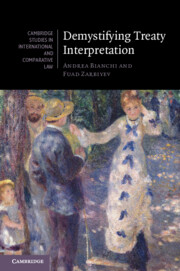Book contents
- Demystifying Treaty Interpretation
- Cambridge Studies in International and Comparative Law: 188
- Demystifying Treaty Interpretation
- Copyright page
- Contents
- Figures
- Preface
- Abbreviations
- 1 The Province of the Rules of Treaty Interpretation
- 2 The Interpreter’s Self
- 3 The Genealogy of the Contemporary Regime of Treaty Interpretation
- 4 Textualism
- 5 Intentionalism
- 6 What’s the Purpose of ‘Object and Purpose’?
- 7 Supplementary Means
- 8 The Magic of Systemic Integration
- 9 Inferential Reasoning and Its Consequences
- 10 Time and Treaty Interpretation
- 11 Text, Author, and Interpretive Control
- 12 Power, Persuasion, and Authority
- Annex Vienna Convention on the Law of Treaties 1969
- Index
- Cambridge Studies in International and Comparative Law
11 - Text, Author, and Interpretive Control
Published online by Cambridge University Press: 07 March 2024
- Demystifying Treaty Interpretation
- Cambridge Studies in International and Comparative Law: 188
- Demystifying Treaty Interpretation
- Copyright page
- Contents
- Figures
- Preface
- Abbreviations
- 1 The Province of the Rules of Treaty Interpretation
- 2 The Interpreter’s Self
- 3 The Genealogy of the Contemporary Regime of Treaty Interpretation
- 4 Textualism
- 5 Intentionalism
- 6 What’s the Purpose of ‘Object and Purpose’?
- 7 Supplementary Means
- 8 The Magic of Systemic Integration
- 9 Inferential Reasoning and Its Consequences
- 10 Time and Treaty Interpretation
- 11 Text, Author, and Interpretive Control
- 12 Power, Persuasion, and Authority
- Annex Vienna Convention on the Law of Treaties 1969
- Index
- Cambridge Studies in International and Comparative Law
Summary
Authors are commonly thought to have a privileged position when it comes to the interpretation of their texts. Since treaties are consensual instruments, it is not surprising that the parties have a say in the interpretation of their treaties. At the same time, treaties cannot escape what is the fate of every text: the possibility to read a text in the absence of its author is structurally inscribed in it. This chapter examines the ways in which the parties can influence treaty interpretation in various phases of the life of the treaties. It also accounts for the diminishing state authority in the modern practice of treaty interpretation.
Keywords
- Type
- Chapter
- Information
- Demystifying Treaty Interpretation , pp. 233 - 251Publisher: Cambridge University PressPrint publication year: 2024

